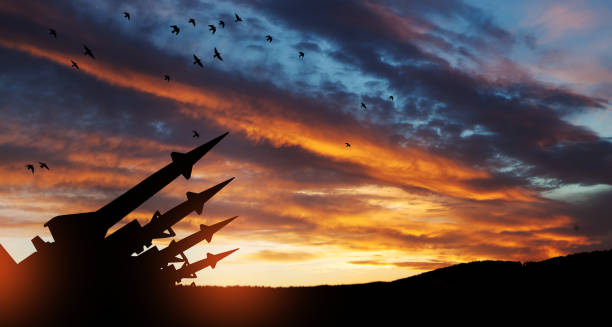
Nuclear Weapon
Kenya stands as a beacon of stability in a region fraught with geopolitical tensions, even without possessing a nuclear weapon.
Understanding the importance of denuclearization, the dangers involved with nuclear weapon warfare, and the necessity for diplomacy over escalation is crucial for appreciating Kenya’s safety.
This blog will delve into the current global landscape, using examples like the Iran-Israel situation, the Ukraine-Russia war, and North Korea’s activities to illustrate why Kenya can remain safe without nuclear arms.
The Importance of Denuclearization
Denuclearization is essential for global peace and security. As nations seek to eliminate nuclear weapons, the goal is to create a safer world. For countries like Kenya, denuclearization promotes stability, reducing the risk of nuclear proliferation in the region. Countries without nuclear weapons, like Kenya, often advocate for denuclearization because it lessens the likelihood of conflict escalating to catastrophic levels.
While some nations view nuclear weapons as a deterrent, this belief can lead to an arms race. Nations might feel compelled to develop or acquire their own nuclear capabilities, creating a cycle of mistrust and fear. Conversely, a commitment to denuclearization can foster cooperation and peace, allowing nations to focus on economic and social development rather than military build-up.
Dangers of Nuclear Weapon Warfare
The dangers associated with nuclear weapon warfare are profound and far-reaching. The catastrophic consequences of a nuclear attack can lead to widespread destruction, loss of life, and long-term environmental damage. Nuclear fallout poses a serious risk, contaminating land and water sources, making areas uninhabitable for generations.
In addition to physical destruction, nuclear weapon warfare brings psychological trauma. The fear of nuclear conflict can lead to anxiety and uncertainty, affecting mental health on a global scale. The repercussions extend beyond the immediate devastation, potentially destabilizing entire regions and leading to mass migrations.
Kenya’s absence of nuclear weapons means that the nation is not part of this dangerous cycle. Instead, it can focus on promoting peace and stability in East Africa, emphasizing the importance of diplomatic solutions over military threats.
Diplomacy Over Escalation
Diplomacy plays a crucial role in preventing conflicts from escalating into full-blown wars, especially in regions affected by tensions. The Iran-Israel situation exemplifies the need for diplomatic dialogue. The ongoing tension between Iran’s nuclear ambitions and Israel’s security concerns has resulted in a precarious situation. Instead of resorting to military actions, diplomatic negotiations can provide avenues for resolution, preventing a catastrophic outcome.
In the case of the Ukraine-Russia war, the lack of effective diplomacy led to a protracted conflict with global ramifications. The initial tensions escalated rapidly, highlighting how diplomatic failures can trigger military responses. By promoting open dialogue and understanding, nations can avoid falling into the traps of escalation and conflict.
North Korea’s Activities and the Chain Reaction
North Korea’s nuclear activities serve as a stark reminder of the chain reactions that can arise from nuclear armament. The development of nuclear weapons by North Korea has provoked neighboring countries to enhance their military capabilities, creating an unstable regional dynamic. This situation emphasizes the need for international cooperation in denuclearization efforts.
As nations react to North Korea’s actions, the potential for a nuclear arms race increases. Countries in East Asia, including South Korea and Japan, may feel compelled to develop their own nuclear arsenals, further destabilizing the region.
This cycle of mistrust can lead to heightened tensions and the risk of miscalculations that could result in nuclear conflict.
In contrast, Kenya’s stance on nuclear weapons promotes a more stable environment. By advocating for denuclearization and diplomacy, Kenya positions itself as a leader in promoting peace and security in East Africa.
Why Kenya Can Remain Safe Without a Nuclear Weapon
Kenya’s safety is grounded in its commitment to regional stability and diplomatic engagement. The nation has fostered relationships with neighboring countries, emphasizing cooperation and dialogue. This approach minimizes the likelihood of conflict and demonstrates that a country does not need a nuclear weapon to be secure.
Kenya’s participation in international organizations, such as the African Union and the United Nations, further enhances its diplomatic standing. By advocating for peaceful resolutions to conflicts and promoting denuclearization, Kenya plays a crucial role in fostering a stable regional environment.
Moreover, Kenya’s diverse economy and vibrant civil society contribute to its resilience. A focus on sustainable development, education, and healthcare strengthens the nation’s stability, reducing the potential for conflict. This holistic approach ensures that Kenya can thrive without resorting to nuclear armament.

Conclusion
In summary, Kenya’s safety is not dependent on possessing a nuclear weapon. The importance of denuclearization, the dangers of nuclear weapon warfare, and the need for diplomacy are vital for understanding Kenya’s secure position. By championing these values, Kenya stands as a model for other nations in the region, showing that peace can be achieved through dialogue rather than military escalation.
Shock-Inducing Fact
Did you know that a single nuclear warhead can unleash destruction equivalent to that of thousands of tons of TNT? In fact, a nuclear strike on a major Kenyan city could result in devastation so vast that it would level buildings and kill thousands within seconds.
The sheer power of a nuclear weapon underscores the importance of denuclearization and the need for peace. The time it takes for such a weapon to cause catastrophic destruction can be measured in mere moments, highlighting the urgency of diplomatic efforts to prevent nuclear warfare.





